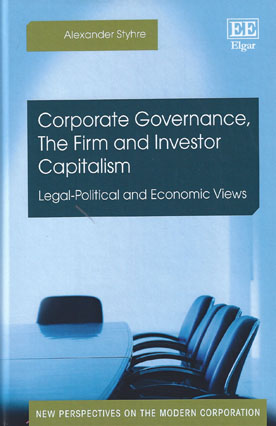We will be closed from 5pm Thursday 17th April for the Easter Bank Holidays, re-opening at 8.30am on Tuesday 22nd April. Any orders placed during this period will be processed when we re-open.

The shift from managerial capitalism to investor capitalism, dominated by the finance industry and finance capital accumulation, is jointly caused by a variety of institutional, legal, political, and ideological changes, beginning with the 1970s' downturn of the global economy.
This book traces how the incorporation of businesses within the realm of the state leads to both certain benefits, characteristic of competitive capitalism, and to the emergence of new corporate governance problems.
Contrasting economic, legal, and managerial views of corporate governance practices in contemporary capitalism, the author examines how corporate governance has been understood and advocated differently during the New Deal era, the post-World War II economic boom, and after 1980 in the era of free market advocacy.
Covering the theory of the firm from the New Deal era until the post-2008 financial crisis, the book connects contemporary theories with their original legal roots, demonstrating inconsistencies in contemporary understanding. It also points at the differences between legal theory and neoclassical economic theory regarding the theory of the firm.
The book examines how the entrenchment of shareholder welfare governance turns a blind eye to legal theory and corporate law, leading to theoretical inconsistencies and practical concerns, and criticises the agency theory argument in favour of unrestricted shareholder welfare governance. A comprehensive review of the literature on corporate governance, both in legal theory and in economics and management studies, is included.
This enlightening and informative book is essential reading for corporate governance scholars, management studies researchers, legal theorists, and business historians.